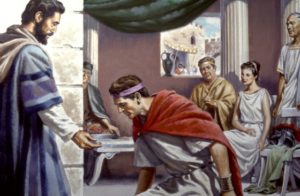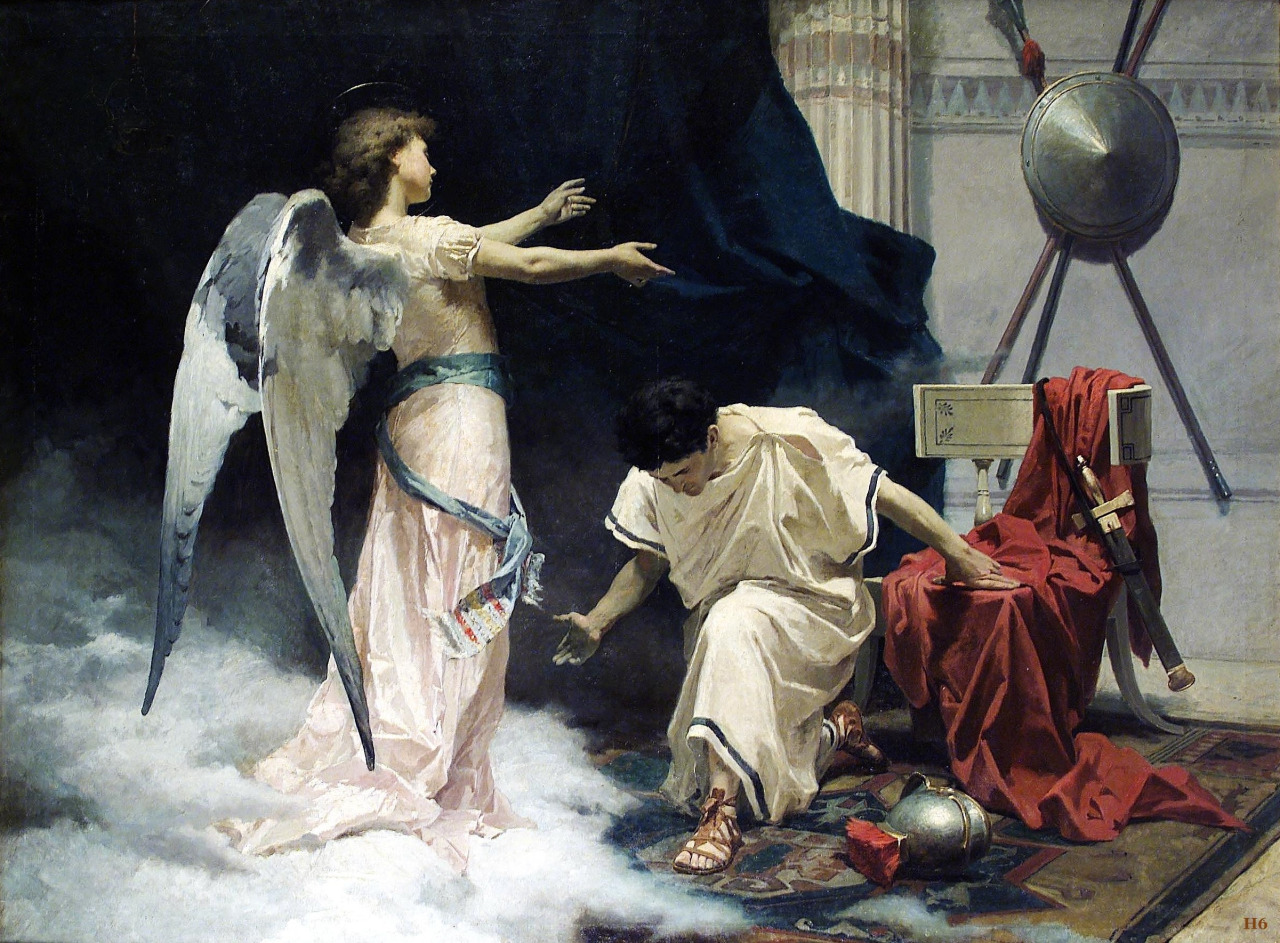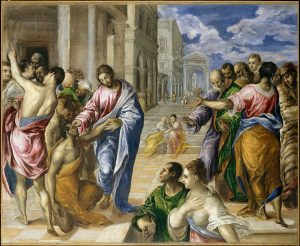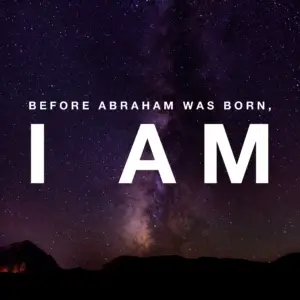Most Christians would agree that our Christology should be derived from Scripture. However, many would be shocked to learn that modern Christianity’s view of Jesus is a hybridization of Biblical and post-Biblical teachings. This blending of New Testament Christology with fourth century philosophy is noticeable when we compare current orthodoxy with Peter’s Christology.
What did Peter believe and teach about the Messiah? If the foremost of the twelve apostles, and a prominent leader in the early Church, believed Jesus to be God-incarnate, we would rightfully expect to find such a core doctrine in his teachings. Let’s examine Peter’s sermon before a Gentile audience to see what he preached about this man from Nazareth.
Cornelius’ Vision

Acts chapter 10 introduces us to Cornelius, a Roman centurion of the Italian cohort. He was a devout man who feared God along with his household. He gave many charitable gifts to the Jews and continually prayed to God.
One day he had a vision in which an angel told him that his prayers and gifts had ascended before God as a memorial. The angel instructed Cornelius to send for Peter, who was staying in a nearby coastal town. Cornelius dispatched two of his servants and a devout soldier to Joppa to find Peter.[1]
The next day we find Peter on the housetop praying when he falls into a trance. He sees a vision of the sky opening and an object like a great sheet filled with all kinds of animals, crawling creatures, and birds. He hears a voice telling him to “kill and eat!” Peter responds by saying, “By no means, Lord, for I have never eaten anything unholy and unclean.” But the voice responded, “What God has cleansed, no longer consider unholy.” The vision is repeated three times. While Peter is contemplating it’s meaning, the Spirit tells him three men are looking for him and that he is to go with them for, “I have sent them Myself.”[2]
Peter Goes to Caesarea
Two days later, Peter and six of his fellow Jews[3] enter Caesarea, where Cornelius, his relatives, and close friends have gathered at the centurion’s home. When Peter meets Cornelius, he says:
Acts 10:28-33 (NASB) And he said to them, “You yourselves know how unlawful it is for a man who is a Jew to associate with a foreigner or to visit him; and yet God has shown me that I should not call any man unholy or unclean. 29 “That is why I came without even raising any objection when I was sent for. So I ask for what reason you have sent for me.”
 Cornelius tells Peter about the angelic vision and says, “So I sent for you immediately, and you have been kind enough to come. Now then, we are all here present before God to hear all that you have been commanded by the Lord.”[4] (emphasis added).
Cornelius tells Peter about the angelic vision and says, “So I sent for you immediately, and you have been kind enough to come. Now then, we are all here present before God to hear all that you have been commanded by the Lord.”[4] (emphasis added).
It is important that we pause here in our summary of Luke’s narrative to point out that God orchestrated this meeting so that Peter could deliver a divine message to these Gentiles. What is it that the Lord God wants these devout God-fearers to know? Surely, He is going to bring clarity to their understanding of who He is. Instead of being the one God of the Jews, He is actually three persons that share a divine nature. Such knowledge would seem critical to the Gentiles’ conversion.
Naturally, we would also expect God to instruct Peter to tell them about Jesus and how he pre-existed in heaven before being incarnated. And how the miracles he performed proved he is God in the flesh, and how Jesus raised himself from the dead, because he is, after all, God. It’s safe to assume that Peter will also tell them that a belief in the Trinity and the deity of Christ is essential to becoming a Christian for, without it, one cannot truly be saved.
Peter’s Sermon
So what did Peter tell these God-fearing Gentiles? We’ll let the apostle’s own words provide the specifics of the message God gave him to share:
Acts 10:36-48 “The word which He sent to the sons of Israel, preaching peace through Jesus Christ (He is Lord of all)— 37 you yourselves know the thing which took place throughout all Judea, starting from Galilee, after the baptism which John proclaimed. 38 “You know of Jesus of Nazareth, how God anointed Him with the Holy Spirit and with power, and how He went about doing good and healing all who were oppressed by the devil, for God was with Him. 39 “We are witnesses of all the things He did both in the land of the Jews and in Jerusalem. They also put Him to death by hanging Him on a cross. 40 “God raised Him up on the third day and granted that He become visible, 41 not to all the people, but to witnesses who were chosen beforehand by God, that is, to us who ate and drank with Him after He arose from the dead. 42 “And He ordered us to preach to the people, and solemnly to testify that this is the One who has been appointed by God as Judge of the living and the dead. 43 “Of Him all the prophets bear witness that through His name everyone who believes in Him receives forgiveness of sins.” (emphasis added)
The critical reader will observe that Peter never says that Jesus previously dwelt in heaven or that he possesses dual natures, one human, the other divine. Moreover, Peter does not, in any way, indicate that Jesus is God, nor is there any mention of a supposed Trinity. On the contrary, Peter identifies Jesus most clearly as being the Christ who is from the town of Nazareth.
 Trinitarians should find it troubling that Peter says that Jesus was anointed by God with the Holy Spirit and power. Scripture tells us that God’s purpose in anointing someone is to empower them to serve Him in the capacity to which he or she has been called. Does God need to be anointed by God and empowered with God the Spirit? Some may respond that Jesus was anointed only in his human nature. But this cannot be corroborated by Scripture. To be sure, the historical record reveals that the theory of Christ’s dual natures (hypostatic union) evolved over several centuries and is not a part of New Testament Christology.
Trinitarians should find it troubling that Peter says that Jesus was anointed by God with the Holy Spirit and power. Scripture tells us that God’s purpose in anointing someone is to empower them to serve Him in the capacity to which he or she has been called. Does God need to be anointed by God and empowered with God the Spirit? Some may respond that Jesus was anointed only in his human nature. But this cannot be corroborated by Scripture. To be sure, the historical record reveals that the theory of Christ’s dual natures (hypostatic union) evolved over several centuries and is not a part of New Testament Christology.
Even more troubling is the way Peter’s divine message contradicts current orthodoxy with regards to Jesus and the miracles he performed. The apostle says the miracles were a result of God working through Jesus. Instead of proving that Jesus is God, as Trinitarians claim, the signs and wonders served to prove that God was with Jesus.
Peter also debunks the notion that Jesus raised himself from the dead by stating that it was God who raised Jesus. What’s more, it was God who granted that Jesus become visible to his disciples after the resurrection. Contrary to what many teach, it wasn’t Jesus, but God, who was ordering and empowering events. According to Peter, it was God who ordered the apostles to “preach” and “testify” that He had appointed this man from Nazareth to be the judge of the living and the dead. If Jesus is God, he would by virtue of his nature be the judge. But Peter tells us it was God who delegated this authority to His Christ.
At every turn, Peter’s sermon undermines Trinitarian claims that Jesus is God by emphasizing instead that Jesus is the agent of God, empowered to do God’s will. Jesus’ testimony, though often overlooked or misinterpreted by orthodoxy, corroborates Peter’s message to the Gentiles:
John 4:34 (NASB) Jesus *said to them, “My food is to do the will of Him who sent me and to accomplish His work. (emphasis added)
John 5:36 (NASB) “But the testimony which I have is greater than the testimony of John; for the works which the Father has given me to accomplish—the very works that I do—testify about me, that the Father has sent me. (emphasis added)
John 10:25 (NASB) Jesus answered them, “I told you, and you do not believe; the works that I do in my Father’s name, these testify of me. (emphasis added)
John 14:10 (NASB)10 “Do you not believe that I am in the Father, and the Father is in me? The words that I say to you I do not speak on my own initiative, but the Father abiding in me does His works. (emphasis added)
John 17:1 and 3-4 (NASB) Jesus spoke these things; and lifting up his eyes to heaven, He said, “Father, the hour has come…3 “This is eternal life, that they may know You, the only true God, and Jesus Christ whom You have sent. 4 “I glorified You on the earth, having accomplished the work which You have given me to do. (emphasis added)
Did God approve of the message Peter preached? The answer is a resounding yes, as evidenced by the outpouring out the Holy Spirit. The Gentiles responded by being baptized in the name of Jesus, who is the Messiah (Christ), not in the name of Jesus, who is God:
Acts 10:44-48 (NASB) While Peter was still speaking these words, the Holy Spirit fell upon all those who were listening to the message. 45 All the circumcised believers who came with Peter were amazed, because the gift of the Holy Spirit had been poured out on the Gentiles also. 46 For they were hearing them speaking with tongues and exalting God. Then Peter answered, 47 “Surely no one can refuse the water for these to be baptized who have received the Holy Spirit just as we did, can he?” 48 And he ordered them to be baptized in the name of Jesus Christ. Then they asked him to stay on for a few days. (emphasis added)
Peter’s Testimony in Jerusalem
In Acts chapter 11, we read again that Peter’s message was ordained by God, for it says that the news had spread throughout Judea that “the Gentiles had received the word of God.” Peter returned to Jerusalem and met with the other apostles and the brethren, for they had heard that he had gone to uncircumcised men and eaten with them. Peter related what had happened and explained that he had learned that they should not call unholy what God has cleansed.[5] Peter offered the Jews this conclusion:
Acts 11:17-18 (NASB) “Therefore if God gave to them the same gift as He gave to us also after believing in the Lord Jesus Christ, who was I that I could stand in God’s way?” 18 When they heard this, they quieted down and glorified God, saying, “Well then, God has granted to the Gentiles also the repentance that leads to life.” (emphasis added)
What was the prerequisite belief that was required before they received the Holy Spirit? Was it a belief in the Trinity or the deity of Christ? No. On the contrary, it was a belief that Jesus was the Christ that brought redemption and the outpouring of the Holy Spirit.
Lest someone claim that Jesus is Lord (Acts 11:17) because he is God, we must recall what Peter said in his sermon on the Day of Pentecost, that it was God who had made Jesus both Lord and Christ (Acts 2:36). Without God’s appointment, Jesus would be neither Lord nor the Christ.
Peter’s ordained message to the Gentiles in Caesarea is consistent with all of his other sermons and the revelation he received directly from God the Father.[6]
Matthew 16:15-18, 20 (NASB) He [Jesus] *said to them, “But who do you say that I am?” 16 Simon Peter answered, “You are the Christ, the Son of the living God.” 17 And Jesus said to him, “Blessed are you, Simon Barjona, because flesh and blood did not reveal this to you, but My Father who is in heaven. 18 “I also say to you that you are Peter, and upon this rock I will build My church; and the gates of Hades will not overpower it…20 Then He warned the disciples that they should tell no one that He was the Christ. (emphasis added)
The Church was built upon the revelation that Jesus is the Christ. Not that he is God or a supposed second member of a Trinity, but that he is the promised Messiah. Unfortunately, this foundational truth was gradually altered through the centuries by converts who had been influenced by Plato and Greek philosophy to the extent that Jesus became co-equal and co-eternal with God the Father.
Peter’s sermon before Cornelius and the Gentiles undermines, instead of affirms, so-called “orthodoxy.” Which begs the question, which view of Christ should we as believers adhere to? Which view should we model our Christology after? Peter’s human Messiah, whom God anointed and worked through? Or the never-mentioned, dual-natured God-Man? Isn’t it time for the Church to start preaching the Jesus that Peter preached?
[2] Acts 10:9-23.
[4] Acts 10:33.
[5] Acts 11:1-16.
[6] Acts 2:14-40; 3:12-26; 4:5-12; 10:28-47; 11:4-18; 15:7-11.





Where in the Bible does it tell us that we are to only believe in what is found in the Bible?
Just because the word Trinity or Internet or Light Bulb isn’t found there, there is no reason to believe in it?
Did God want to stop us from learning, believing about things He reveals to us in Christ?
Greetings,
Thanks for your comments.
Paul wrote to Timothy about the sufficiency of Scripture (2 Tim. 3:16). He also told the Church in Ephesus that he did not withhold from declaring to them anything that was profitable or beneficial for them to know (Acts 20:20). If the doctrine of the Trinity were true, wouldn’t that be the most fundamental teaching of all Christianity! Surely, that is one he would deem profitable and important to share. However, Paul never taught that Jesus and the Spirit of God are co-equal, consubstantial, coeternal, etc. to God the Father, nor did any of the other New Testament writers. Indeed, Jude wrote that we are to earnestly contend for the faith that was once for all handed down to the saints. The doctrine of the Trinity was never handed down to the saints.
To answer your question, “Did God want to stop us from learning, believing about things He reveals to us in Christ?” Of course not, that is my point. We can and should continue to grow in our understanding of what has been revealed in Scripture. But when so called post-Biblical revelations (doctrine) contradict what Scripture teaches, we must reject it.
The problem is not that the word Trinity does not appear in Scripture. I would have no problem with that if the doctrine was actually taught in Scripture. What is of greater importance is that the doctrine of a triune God does not appear anywhere in the Bible. Even well respected Biblical scholars admit that the teaching that God is three persons is a post-Biblical development (See: What Scholars Have to Say). In other words, it is not taught in Scripture. Not only does the doctrine go beyond what the Bible says, which we are warned against doing (Deut. 12:32; Prov. 30:6; 1 Cor. 4:6; Rev. 22:18) it violates what has been clearly taught, that God is one person, Jesus is His human Messiah, and the Holy Spirit is the Spirit of God.
Again, thanks for reaching out.